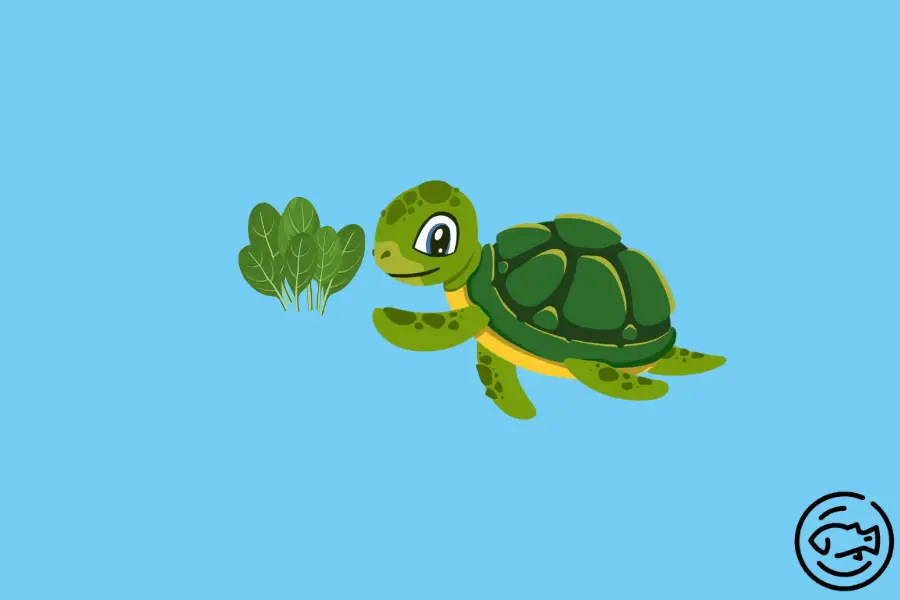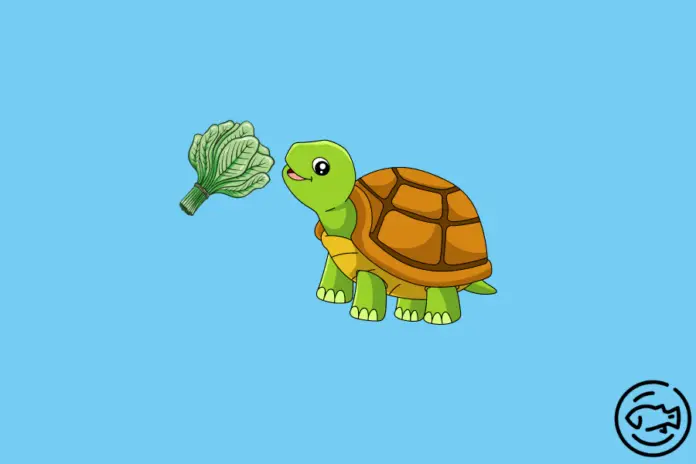In this post, we are discussing – Can Turtles Eat Spinach or not.
It is essential to verify their safety and health benefits before incorporating raw nourishment into your turtle’s meal plans. Turtles have a reputation for enjoying an array of green leafage and assorted vegetables, but is it safe for them to consume spinach?
In short, the answer is Yes, but due to its inherent hazards, spinach should only be sparingly given to turtles and in small proportions.
It is more reasonable to steer clear of spinach, as numerous other foods can provide equivalent nutritional merit to turtles without worries.
Discovering whether turtles can consume spinach involves understanding their dietary needs and ability to digest this particular vegetable.
Additionally, it is crucial to comprehend the nutritional value of spinach and its impact on turtles’ overall health and well-being.
Can Turtles Eat Spinach?

There are several vital elements to consider regarding the risks associated with feeding spinach to turtles.
The primary concern is the inflated oxalic acid content that is found in spinach, which can potentially lead to the formation of kidney stones in turtles.
The Risks of Feeding Spinach to Turtles
High Oxalic Acid Content
- Spinach’s High Oxalic Acid Content
- Possible Consequences of Excessive Oxalic Acid Intake
- Alternatives to Spinach for Turtle Diets
- Considerations for a Balanced Calcium-Rich Diet
Oxalic acid content in spinach poses risks and consequences if consumed excessively by turtles.
Turtle owners must adhere to recommendations that restrict spinach intake. Additionally, alternative vegetables should be considered to maintain a well-rounded diet for their turtles.
Recommendations for Feeding Spinach
- Feed spinach to turtles in moderation.
- Supplement spinach with calcium sources like cuttlebone or calcium powder to prevent mineral deficiencies.
- Consider other vegetables with lower oxalic acid content, such as carrots or green beans, as alternatives to spinach.
- Rotate the mustard greens in the turtle’s diet to provide variety and ensure a balanced nutrition intake.
Notably, turtles require a diet that meets their nutritional needs, and more than spinach is required.
Other Vegetables to Avoid
Spinach is not the only vegetable that should be avoided when feeding turtles. Several other vegetables can be harmful to turtles if consumed.
- Avocado: Avocado has a substance named persin, which is harmful to turtles.
- Tomato leaves and stems: Tomato plants contain a toxin called solanine, which can poison turtles.
- Potato leaves and stems: Like tomato plants, potato plants also contain solanine, making them harmful to turtles.
- Mushrooms: Certain mushrooms can be toxic to turtles and should be avoided in their diet.
- Corn: While some turtles may enjoy corn as a treat, it should not be a staple part of their diet as it is high in carbohydrates and low in nutritional value.
It is important to note that these are not the only vegetables that should be avoided when feeding pet turtles. It is always best to do thorough research or consult a veterinarian to ensure your turtle’s diet is appropriate and safe.
Turtles have specific dietary needs that must be met to stay healthy. Providing them with incorrect foods can lead to serious health issues such as calcium deficiency. This can result in soft shell syndrome, metabolic bone disease, and stunted growth.
The Importance Of Calcium For Turtles
As a turtle enthusiast, I’ve always been fascinated by the dietary needs of these captivating creatures.
One crucial aspect that cannot be overlooked is the importance of calcium in a turtle’s diet.
In this section, we’ll dive deeper into the significance of calcium for turtles and the potential consequences of calcium deficiency.
Consequences Of Calcium Deficiency
Calcium deficiency in turtles can have severe consequences for their health and well-being. Insufficient calcium intake can lead to various problems, including weak bones, shell deformities, and even paralysis.
Without an adequate supply of calcium, turtles may experience difficulties maintaining strong bones or skeletal structure. This can result in injury vulnerability, decreased mobility, and compromised health.
To prevent the consequences of calcium deficiency, provide turtles with a balanced diet that includes foods rich in calcium. This nutrient is essential for developing and maintaining solid shells and bones.
Turtles should have access to various calcium-rich sources such as leafy greens, small fish or insects with bones or exoskeletons, and commercial turtle pellets fortified with calcium.
It is worth mentioning that calcium deficiency affects the physical well-being of turtles and has implications for their reproductive health. Female turtles deficient in calcium may produce eggs with weak shells or struggle to lay them correctly. This can lead to reproductive complications and hinder the overall breeding success of turtles.
Proper Diet For Turtles
When it comes to securing the health and well-being of our turtles, providing them with a proper diet is of utmost importance.
In this section, we will discuss the different dietary needs of turtles, dividing them into two categories: omnivorous turtles and herbivorous turtles. By understanding their specific dietary requirements, we can ensure that our turtles receive the necessary nutrients to thrive.
Omnivorous Turtles
Omnivorous turtles have a diverse diet, consuming plant matter and animal protein. They require a balanced mix of leafy vegetables, fruits, and insects for optimal nutrition.
Here is a table that provides information on the recommended diet for omnivorous turtles:
| Food Type | Serving Size | Frequency |
|---|---|---|
| Leafy greens | 2-3 times daily | Daily |
| Fruits | Small portions | Every other day |
| Insects | Moderate amount | 2-3 times weekly |
In addition to these foods, omnivorous turtles can benefit from occasional treats such as earthworms or small fish.
While omnivorous turtles have the advantage of being able to consume a variety of food types, it is crucial to provide them with a well-balanced diet that meets their nutritional needs. This can help prevent issues like nutrient deficiencies or obesity.
Historically, researchers have observed that omnivorous turtles in their natural habitat have adapted their feeding behaviour based on diverse food sources. This flexibility allows them to survive and thrive in diverse environments.
Herbivorous Turtles
Herbivorous Turtles are known for their vegetarian diet and depend on plants for nutrition. They swallow diverse plant materials such as fruits, green vegetables, and leafy greens. This type of turtle has specific dietary requirements that need to be met to confirm its overall health and well-being.
- 1. Essential Nutrients: Herbaceous turtles require a diet rich in fibre, vitamins, and minerals.
- 2. Leafy Greens: Their diet mainly consists of leafy greens like kale, collards, mustard greens and dandelion greens.
- 3. Fruits: Fruits such as berries and melons can also be included in their diet but should be given in moderation.
- 4. Calcium-Rich Foods: Herbaceous turtles must regularly consume calcium-rich foods to prevent calcium deficiency.
- 5. Variety is Key: Offering a varied selection of green vegetables and plants helps provide different nutrients and keeps them interested in their food.
- 6. Avoiding Toxic Plants: It is vital to research and avoid feeding herbivorous turtles any toxic or harmful plants.
In addition to their plant-based diet, herbivorous turtles also need access to clean water for drinking and swimming. Providing the proper environment with adequate UVB lighting is essential for their health and well-being.
Concerns For Feeding Pet Turtles
Concerns for feeding pet turtles revolve around their specific dietary needs to ensure their health and well-being.
- Variety: Pet turtles require a diverse diet of leafy greens, vegetables, fruits, and commercial turtle food to meet their nutritional requirements.
- Calcium Balance: Maintaining a proper calcium-to-phosphorus ratio is crucial for pet turtles. Calcium-rich foods such as cuttlebone should be provided regularly.
- Avoid Toxic Foods: While spinach is safe for turtles in moderation, excessive consumption can lead to the accumulation of oxalates, causing kidney damage. Avoid feeding spinach as a staple food.
Additionally, it is essential to note that offering a shallow water container for drinking and soaking purposes is vital for a turtle’s overall health.
Conclusion
Turtles’ consumption of spinach can be determined by analyzing their dietary needs and preferences.
Although turtles are known to consume a varied diet, spinach should be given to them in moderation due to its high oxalate content, which can interfere with calcium absorption.
Alternatives like kale or collard greens can be considered essential nutrients for turtles. Consulting a veterinarian or reptile expert is recommended to ensure a balanced and nourishing diet for turtles.
A unique detail is that turtles are herbivores and require a diet primarily consisting of leafy greens, vegetables, and fruits. Providing a diverse range of foods to meet their nutritional requirements is crucial.
Additionally, some aquatic turtle species have specific dietary preferences, so it is crucial to research and understand the needs of individual turtle species.
Turtles, being ectothermic animals, rely on external sources like sunlight to maintain their body temperature. Exposure to sunlight helps turtles synthesize vitamin D3, which aids in calcium absorption.
Therefore, along with a proper diet, ensuring adequate access to sunlight or using UVB lighting is essential for the overall health of turtles.


